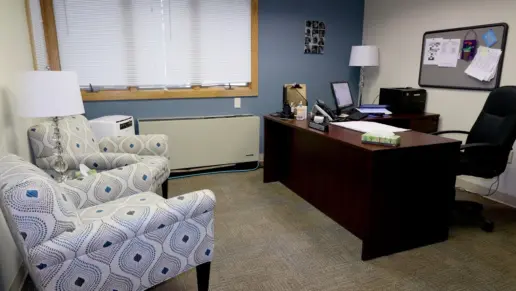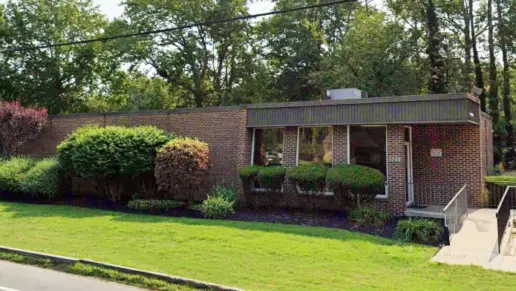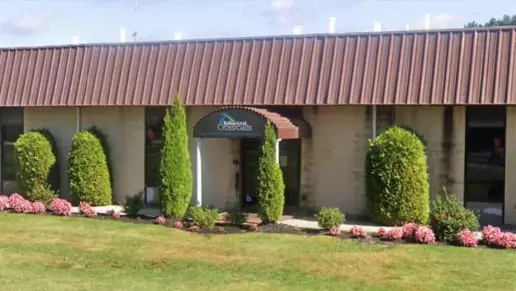About New Chapter Faith Based Recovery
New Chapter Faith Based Recovery is a substance use treatment facility in Parsippany, New Jersey. The facility is located right near the Boonton Reservoir, so you can enjoy relaxing activities such as walking, hiking and bird watching, which can be great ways to unwind after your treatment sessions. New Chapter treats clients with addictions to substances such as opioids, marijuana, alcohol and prescription medications. They offer outpatient treatment programs for both adults and adolescents. You can pay for services through insurance coverage, community resources, personal loans or scholarships.
Specialized Addiction Treatment for Veterans
New Chapter Faith Based Recovery understands that veterans have unique issues that contribute to addiction. The facility can provide specialized treatment that focuses on healing PTSD or trauma through evidence based therapies and a 12 Step approach. Counselors will address the emotional and spiritual aspects of your addiction and help you develop coping skills to support your recovery.
Treatment Centered Around Faith
The facility is able to cater to clients who want to incorporate returning to their identity in Christ as a part of their addiction treatment. You’ll receive individual Christian counseling, participate in specialized Christian based recovery groups, and engage in group Bible studies for addiction and alcohol recovery. This treatment program also provides fitness and wellness services and aroma and body massage services.
Healing Through Connection With Animals
One other program at this facility that stands out to me is the Animal Assisted Therapy Program. The facility primarily uses dogs to connect with you and offer therapeutic benefits. Your sessions will involve walking, grooming and spending time with animals. This form of therapy can help you to be more engaged in the recovery process and enhance your mood.
Rehab Score
Accepted Insurance




Other Forms of Payment
Self-pay involves paying for treatment out of your own pocket. You can use savings or credit, get a personal loan, or receive help from family and friends to fund your treatment. If you don't have insurance or your insurance plan doesn't cover a specific program, self-pay can help ensure you still get the care you need.
Private insurance refers to any kind of healthcare coverage that isn't from the state or federal government. This includes individual and family plans offered by an employer or purchased from the Insurance Marketplace. Every plan will have different requirements and out of pocket costs so be sure to get the full details before you start treatment.
Private insurance refers to any kind of healthcare coverage that isn't from the state or federal government. This includes individual and family plans offered by an employer or purchased from the Insurance Marketplace. Every plan will have different requirements and out of pocket costs so be sure to get the full details before you start treatment.
Military members, veterans, and eligible dependents have access to specific insurance programs that help them get the care they need. TRICARE and VA insurance can help you access low cost or no cost addiction and mental health treatment. Programs that accept military insurance often have targeted treatment focused on the unique challenges military members, veterans, and their families face.
Addiction Treatments
Levels of Care
Treatments
Alcoholism (alcohol use disorder) is diagnosed when a person's drinking causes harm or distress and they continue to drink anyway. Often, they have a physical as well as psychological dependence on the substance. To treat alcohol addiction, medical detox is often necessary to safely withdraw from alcohol. Once this is complete, alcohol rehab in New Jersey can provide skills and supports necessary for long-term recovery.
New Jersey has a variety of dual-diagnosis addiction treatment programs, including inpatient and outpatient drug and alcohol rehabs, that recognize the unique needs of individuals with co-occurring substance use disorders and mental health conditions. These programs typically employ evidence-based therapies such as cognitive-behavioral therapy (CBT), dialectical behavior therapy (DBT), trauma-focused therapy, and art therapy to successfully address co-occurring disorders and support sustained recovery.
New Jersey has a range of mental health and substance abuse treatment programs providing dual-diagnosis treatment. These rehabs provide effective treatment for co-occurring disorders, which typically involves an inpatient or outpatient program. Treatment often includes a mental health evaluation, individualized treatment plan, individual and group therapy, evidence-based interventions like cognitive behavioral therapy, and psychoeducation. When combined, these programs and therapeutic interventions can successfully address co-occurring disorders to improve mental health and well-being.
You can find comprehensive substance abuse treatment in New Jersey in drug and alcohol rehabs. These treatment programs typically provide a full continuum of care including medically assisted detox, inpatient, outpatient, dual-diagnosis, and intensive outpatient. With a comprehensive substance abuse evaluation, addiction experts provide individualized treatment plans to meet your specific needs. These programs address substance use disorders using evidence-based therapies, like cognitive behavioral therapy (CBT) and dialectical behavioral therapy (DBT), individual and family counseling, and recovery support groups.
Programs


Clinical Services
Group therapy settings offer you a diverse perspective on addiction and recovery. People from a variety of backgrounds gather together to discuss their challenges and speak openly and in a nonjudgmental atmosphere. This enriches your experience and your understanding of addiction and recovery.
During individual therapy for drug addiction, patients receive a customized and tailored approach to understanding their unique circumstances and providing them with targeted interventions. These include coping skills, relapse prevention plans, and developing resilience, all of which are essential for long term recovery.
Family therapy sessions address addiction related conflicts and other issues between members of the family unit. By strengthening communication and coping skills, as well as creating a nurturing environment, the family can help support their loved one's recovery.
Trauma therapy provides a structure to approach healing from past traumatic events that you may have witnessed or experienced. Your therapist will work with you to identify and process these memories. This helps promote a sense of safety and stability and helps you heal emotionally.
Cognitive behavioral therapy (CBT) in New Jersey typically follows a set structure of treatment. The therapist helps clients identify their life challenges and their thoughts surrounding those challenges. The client then learns to identify unhealthy thought patterns and reshape those into healthy patterns of thinking and behavior.
Building life skills allows you to demolish negative patterns of behavior and build new, healthy patterns. By building new thought processes, coping strategies, and behaviors, you establish a solid foundation for recovery.
Dialectical means opposing. The premise of dialectical behavior therapy is to learn how two things that seem to be opposite can actually be true. You learn how to accept yourself while also making changes. The focus is on accepting your emotions and changing how you manage them.
Motivational interviewing helps clients find their motivation to change. It can be an effective method to work with clients who are angry or hostile or feel insecure about their ability to make changes in their lives. It is often used during addiction treatment or to manage physical health conditions.
Nutrition therapy is more than a simple meal plan during rehab. It's designed to facilitate a faster recovery by giving your body the nutrients it needs to heal. It aids in strengthening your systems and giving you the energy you need for daily functioning and success in other therapies.
Recreational therapy is a dynamic approach to addiction treatment in New Jersey. It integrates activities like music therapy, team sports, and gardening so you have a therapeutic outlet for your emotions and stress. This improves your physical and mental health and helps you develop new skills to support a sober lifestyle.
Therapists combine exercise with drug and alcohol addiction treatment interventions to give you a natural way to manage withdrawal symptoms and reduce cravings. This holistic and structured approach is tailored to your fitness level and preferences while establishing a routine that provides structure and a sense of normalcy in daily life.
Amenities
-
Private Setting
Accreditations

The Joint Commission, formerly known as JCAHO, is a nonprofit organization that accredits rehab organizations and programs. Founded in 1951, the Joint Commision's mission is to improve the quality of patient care and demonstrating the quality of patient care.
Joint Commission Accreditation: Yes

State Licenses are permits issued by government agencies that allow rehab organizations to conduct business legally within a certain geographical area. Typically, the kind of program a rehab facility offers, along with its physical location, determines which licenses are required to operate legally.
State License: New Jersey

LegitScript has reviewed New Chapter Faith Based Recovery as part of their certification program, and has determined that it meets the LegitScript standards for legality, safety and transparency.
LegitScript verified in
Contact Information
1915 US-46
Parsippany-Troy Hills, NJ 07054
















